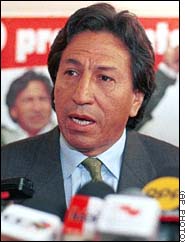2006.07.24: July 24, 2006: Headlines: Figures: COS - Peru: Politics: Congress: Free Trade: Heritage: Six Reasons to Support a U.S.-Peru Free Trade Agreement
Peace Corps Online:
Directory:
Peru:
Friend of the Peace Corps: Alejandro Toledo :
Special Report: President Alejandro Toledo:
2006.07.11: July 11, 2006: Headlines: Figures: COS - Peru: Politics: Yahoo News: Toledo meets Bush, urges US Senate pass trade pact :
2006.07.24: July 24, 2006: Headlines: Figures: COS - Peru: Politics: Congress: Free Trade: Heritage: Six Reasons to Support a U.S.-Peru Free Trade Agreement
Six Reasons to Support a U.S.-Peru Free Trade Agreement

Thanks to fiscal restraint and sound planning, Peru has enjoyed 5 percent annual economic growth since the election of President Alejandro Toledo in 2001. Over that period, more than 500,000 Peruvians have risen above the poverty line. But more needs to be done to encourage small- and medium-sized businesses. The U.S.-Peru TPA would open doors to sustained growth and mandate deeper reforms that will encourage millions more Peruvians to participate in the formal economy.
Six Reasons to Support a U.S.-Peru Free Trade Agreement
Six Strategic Reasons to Support a U.S.-Peru Free Trade Agreement
by Ana Isabel Eiras and Stephen Johnson
WebMemo #1172
July 24, 2006
[Excerpt]
How a U.S.-Peru Free Trade Agreement Serves U.S. Interests
Largely because of commitments elsewhere, the United States provides less and less foreign aid to Latin America than in the past. Nonetheless, it is the private sector that drives economic growth and creates jobs in free societies. The U.S.-Peru Trade Promotion Agreement will help sustain growth in this key country and maintain U.S. engagement with the region. The pact would serve America’s interests in six ways:
1. It benefits the U.S. economy. Once approved by Congress, the trade pact will immediately allow 80 percent of U.S. industrial and textile products and over 60 percent of American farm products to enter the Peruvian market duty-free. The remaining barriers will phase out in 15 years. The pact permanently lowers U.S. barriers to Peruvian goods, to the benefit of U.S. consumers.
2. It counters anti-American sentiment. The U.S.-Peru TPA was approved overwhelmingly by Peru’s unicameral legislature, and U.S. approval would demonstrate faith in a long-time friend and commercial partner. The TPA fills a vacuum that would be left by the expiration of U.S.-Andean trade preferences at the end of 2006. As a consequence, it would also help block Hugo Chávez’s populist advances made through loan offers and oil concessions to Peruvian politicians in exchange for personal loyalty.
3. It rewards pro-market progress. Thanks tofiscal restraint and sound planning, Peru has enjoyed 5 percent annual economic growth since the election of President Alejandro Toledo in 2001. Over that period, more than 500,000 Peruvians have risen above the poverty line. But more needs to be done to encourage small- and medium-sized businesses. The U.S.-Peru TPA would open doors to sustained growth and mandate deeper reforms that will encourage millions more Peruvians to participate in the formal economy.
4. It fosters stability in a highly unstable region. The U.S.-Peru TPA would help Peruvians consolidate current reforms and build on the rules and institutions that are conducive to doing business. These reforms will increase growth and provide average Peruvians with tangible improvements in their lives. This is extremely important because, despite Peru’s progress, nearly half of all Peruvians are still poor and susceptible to populist rhetoric that seeks to replace trade, investment, and markets with repressive economic and political controls, such as are now being contemplated in neighboring Bolivia.
5. It supports a key ally. For more than a decade, Peru has been a partner in combating narcotics trafficking and countering regional terror groups. Under President Toledo, Peru has stood up to the anti-U.S. rhetoric of Venezuela’s Hugo Chávez in such forums as the Summit of the Americas. In the United Nations, Peru has voted in favor of applying nuclear safeguards to Iran and condemned North Korea for its offensive missile tests. In addition, it sent peacekeepers to help stabilize Haiti’s transition back to elected rule.
6. It nurtures a growing trade bloc. U.S. efforts to encourage regional trade began in the 1990s with President George H.W. Bush’s Enterprise in the Americas Initiative and the North American Free Trade Agreement. They were to have concluded with the Free Trade Area of the Americas last year. Approving the U.S.-Peru TPA would give hope to other countries that they can forge similar ties with the United States. Freer markets will facilitate commerce and investment and provide a more public-spirited alternative to Chinese deals involving government officials and monopolies.
When this story was posted in July 2006, this was on the front page of PCOL:





Peace Corps Online The Independent News Forum serving Returned Peace Corps Volunteers
 | Changing the Face of Hunger
In his new book, Former Congressman Tony Hall (RPCV Thailand) says humanitarian aid is the most potent weapon the United States can deploy against terrorism. An evangelical Christian, he is a big believer in faith-based organizations in the fight against hunger. Members of Congress have recently recommended that Hall be appointed special envoy to Sudan to focus on ending the genocide in Darfur. |
 | PC will not return to East Timor in 2006
Volunteers serving in East Timor have safely left the country as a result of the recent civil unrest and government instability. Latest: The Peace Corps has informed us that at this time, the Peace Corps has no plans to re-enter the country in 2006. The Peace Corps recently sent a letter offering eligible volunteers the opportunity to reinstate their service in another country. |
 | Chris Dodd considers run for the White House
Senator Chris Dodd plans to spend the next six to eight months raising money and reaching out to Democrats around the country to gauge his viability as a candidate. Just how far Dodd can go depends largely on his ability to reach Democrats looking for an alternative to Hillary Clinton. PCOL Comment: Dodd served as a Volunteer in the Dominican Republic and has been one of the strongest supporters of the Peace Corps in Congress. |
 | Vasquez testifies before Senate Committee
Director Vasquez testifies before the Senate Foreign Relations Committee on his nomination as the new Representative to the United Nations Agencies for Food and Agriculture replacing Tony Hall. He has been the third longest serving Peace Corps Director after Loret Ruppe Miller and Sargent Shriver. PCOL Comment: Read our thanks to Director Vasquez for his service to the Peace Corps. |
 | Interview with a Hit Man
RPCV John Perkins says that for many years he was an "economic hit man" in the world of international finance whose primary job was to convince less developed countries to accept multibillion dollar loans for infrastructure projects that left the recipient countries wallowing in debt and highly vulnerable to outside political and commercial interests. In this exclusive interview for "Peace Corps Online," Colombia RPCV Joanne Roll, author of Remember with Honor, talks to Perkins about his Peace Corps service, his relation with the NSA, "colonization" in Ecuador, the consequences of his work, why he decided to speak out, and what his hopes are for change. |
 | Peace Corps stonewalls on FOIA request
The Ashland Daily Tidings reports that Peace Corps has blocked their request for information on the Volkart case. "After the Tidings requested information pertaining to why Volkart was denied the position — on March 2 — the newspaper received a letter from the Peace Corps FOIA officer stating the requested information was protected under an exemption of the act." The Dayton Daily News had similar problems with FOIA requests for their award winning series on Volunteer Safety and Security. |
 | PCOL readership increases 100%
Monthly readership on "Peace Corps Online" has increased in the past twelve months to 350,000 visitors - over eleven thousand every day - a 100% increase since this time last year. Thanks again, RPCVs and Friends of the Peace Corps, for making PCOL your source of information for the Peace Corps community. And thanks for supporting the Peace Corps Library and History of the Peace Corps. Stay tuned, the best is yet to come. |
 | History of the Peace Corps
PCOL is proud to announce that Phase One of the "History of the Peace Corps" is now available online. This installment includes over 5,000 pages of primary source documents from the archives of the Peace Corps including every issue of "Peace Corps News," "Peace Corps Times," "Peace Corps Volunteer," "Action Update," and every annual report of the Peace Corps to Congress since 1961. "Ask Not" is an ongoing project. Read how you can help. |
 | RPCV admits to abuse while in Peace Corps
Timothy Ronald Obert has pleaded guilty to sexually abusing a minor in Costa Rica while serving there as a Peace Corps volunteer. "The Peace Corps has a zero tolerance policy for misconduct that violates the law or standards of conduct established by the Peace Corps," said Peace Corps Director Gaddi H. Vasquez. Could inadequate screening have been partly to blame? Mr. Obert's resume, which he had submitted to the Peace Corps in support of his application to become a Peace Corps Volunteer, showed that he had repeatedly sought and obtained positions working with underprivileged children. Read what RPCVs have to say about this case. |
 | Why blurring the lines puts PCVs in danger
When the National Call to Service legislation was amended to include Peace Corps in December of 2002, this country had not yet invaded Iraq and was not in prolonged military engagement in the Middle East, as it is now. Read the story of how one volunteer spent three years in captivity from 1976 to 1980 as the hostage of a insurrection group in Colombia in Joanne Marie Roll's op-ed on why this legislation may put soldier/PCVs in the same kind of danger. Latest: Read the ongoing dialog on the subject. |
Read the stories and leave your comments.

Some postings on Peace Corps Online are provided to the individual members of this group without permission of the copyright owner for the non-profit purposes of criticism, comment, education, scholarship, and research under the "Fair Use" provisions of U.S. Government copyright laws and they may not be distributed further without permission of the copyright owner. Peace Corps Online does not vouch for the accuracy of the content of the postings, which is the sole responsibility of the copyright holder.
Story Source: Heritage
This story has been posted in the following forums: : Headlines; Figures; COS - Peru; Politics; Congress; Free Trade
PCOL33749
65
























